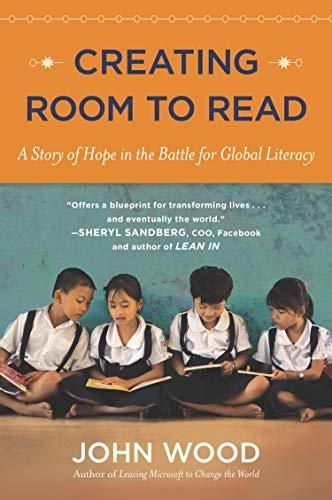John Wood offers a sequel to his seminal Leaving Microsoft to Change the World, detailing how his charity brings books and literacy to children worldwide.

Creating Reading Rooms
John Wood founded the nonprofit Room to Read, which believes “World Change Starts with Educated Children.” The organization is bringing education to 16.6 million children in 16 countries.
Wood returns with a sequel to his 2006 bestseller, Leaving Microsoft to Change the World, which outlined the beginnings of Room to Read. Here, he charts the organization’s remarkable growth in the years since and offers a blueprint for others who might wish to emulate his level of civic and social action. Wood and his team regard financial support for education and literacy as an investment, not a charity. He shares many heartwarming stories, as well as a number of stark challenges he and his team have faced. Given that in the developing world 780 million illiterate people – including 300 million kids – need education, Wood makes a persuasive argument for the virtues of literacy.
Room to Read
In 1999, John Wood, then 35, left his lucrative position as Director of Business Development for Microsoft in greater China to fulfill a promise to a village in Nepal that he would return bearing books. Room to Read now delivers books to libraries and schools in the world’s poorest nations and offers thousands of scholarships to children.
From 2000 to 2010, Wood and his volunteers built 10,000 libraries. As of 2012, they had supported 17,000 young students via the organization’s Girls’ Education program, published 700 titles in local languages and trained numerous teachers.
The need is global, growing more urgent by the day. John Wood
The Girls’ Education program pays education-related fees, provides mentoring, and buys school supplies and uniforms. As of 2011, more than 60% of its graduates were enrolled in post-secondary institutions.
Educated women often educate their entire families, and education means higher earnings, healthier populations and longer life spans. Countries with access to education are less likely to experience civil unrest, terrorism or war. As educated people form a new middle class in developing nations, they solve complex national problems and support those solutions with their taxes. Education may not protect against poor governance or isolated location, but it leads to greater stability and prosperity.
Challenge Grants
Wood devised Room to Read’s challenge grant model to inspire communities to participate in their own improvement. The Room to Read team coordinates with local people to ensure its project plans are culturally appropriate and oversees three- to five-year efforts to build schools or libraries. When the structures are completed, national education ministries provide teachers and take stewardship.
By requiring…community residents to pitch in, we are saluting their inherent dignity. John Wood
In the Nepalese Himalayas, Wood found that dozens of families would trek to deliver their sorghum donations to the community stockpile. And in Zambia, a single person runs the library, providing access to 1,000 students, five days a week, while also overseeing the “piggery,” where pigs are bred and sold.
The challenge grant model allows Room to Read to allocate time and resources efficiently, knowing that eager co-investors await. Benefactors feel good knowing they aren’t financing a cycle of dependency.
Not A Charity
Room to Read believes calling itself a charity would imply dependency. It asks for investments, not donations. Wood runs it like a business and doesn’t spend donations raising more money.
He’s proud that Room to Read employees think big – 300 million school-age kids and 780 million illiterate adults count on them.
We needed to build a team that could create, grow and run a massive organization with the rigor, accountability and best practices that characterize the most successful for-profit companies.John Wood
Wood calculates how many kids his organization serves and how many schools and libraries it builds in return for each investment as the organization battles overhead costs. He disapproves of nonprofits that purchase expensive all-terrain vehicles and paint their logo on the sides. The cost of one Land Rover, he notes, could pay for 75,000 children’s books at wholesale cost or support the building of 15 libraries to serve 7,000 kids. He favors paying locals for transport.
Africa
Wood knew of Africa’s reputation for corruption and violence, but wouldn’t attribute the sins of leaders to their most vulnerable subjects. Half of sub-Saharan Africa’s 800 million people live on less than one dollar a day. When Room to Read began working in Africa, half the population was younger than 15, and kids desperately needed education.
One day we’d look back and see the decision to go into Africa as a pivotal one in taking Room to Read to scale.John Wood
Wood began in South Africa, where a trusted local team leader stole $15,000. He fired her, and then removed her office team because of threats against them.
A year later, the organization came to Zambia. In a village where Room to Read launched a library and a program to publish books for children in eleven of South Africa’s languages, the children composed and performed a song: “We picked up the phone to call for help. And John Wood answered our call.”
Forward
Wood returned to Nepal to celebrate opening Room to Read’s 10,000th library. Room to Read also hired Nepalese artists and storytellers to write books, with a budget for publishing 10,000 copies of 10 titles.
Education is the most powerful weapon which you can use to change the world.Nelson Mandela
In 2007, Wood stepped down as CEO of Room to Read in favor of his co-founder Erin Ganju. That year, Cathay Pacific Airlines donated a massive 777-300 cargo jet for a one-time flight to deliver 400,000 books to Asia. And, the UAE pledged to build 1,000 libraries and donate one million books.
John Wood believes Room to Read can reach 100 million children in his lifetime.
Inspiration
Wood is an absurdly inspiring figure and not a bad writer. He somehow lists his incredible achievements without ever seeming to boast. He subsumes his persona into the descriptions of his charity and of the children in need he wants to serve. Yet he is never corny and his stories of success are moving and memorable.
Wood’s descriptions of his business and logistical methods are arresting and inspirational. His innovative approach and determination differentiates his charity, and his book is a superb read for young people who are considering public service or for adults, like him, who are inspired to lead.
John Wood also wrote Leaving Microsoft to Change the World. He co-authored Purpose, Incorporated with Amalia McGibbon and Zak the Yak with Books on His Back with Abin Shrestha












